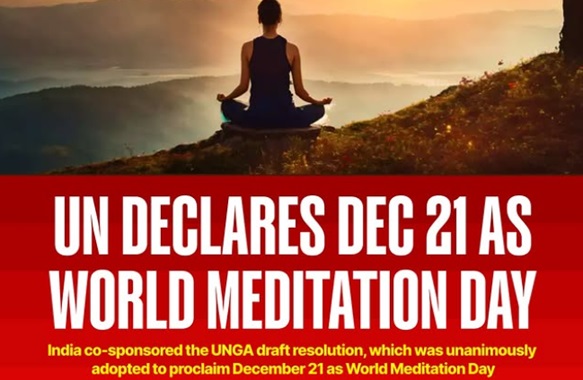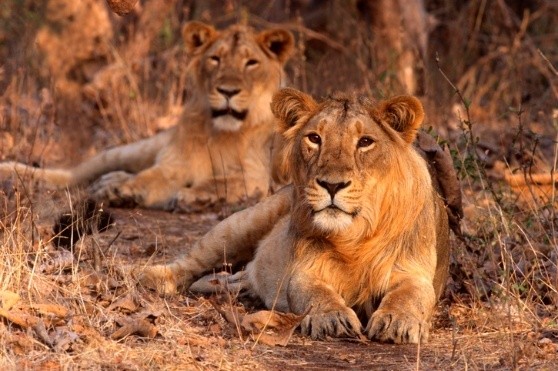- Courses
- GS Full Course 1 Year
- GS Full Course 2 Year
- GS Full Course 3 Year
- GS Full Course Till Selection
- Online Program
- GS Recorded Course
- NCERT (Recorded 500+ Hours)
- Polity Recorded Course
- Geography Recorded Course
- Economy Recorded Course
- AMAC Recorded Course
- Modern India, Post Independence & World History
- Environment Recoded Course
- Governance Recoded Course
- Science & Tech. Recoded Course
- International Relations and Internal Security Recorded Course
- Disaster Management Module Course
- Ethics Recoded Course
- Essay Recoded Course
- Current Affairs Recoded Course
- CSAT
- 5 LAYERED ARJUNA Mentorship
- Public Administration Optional
- ABOUT US
- OUR TOPPERS
- TEST SERIES
- FREE STUDY MATERIAL
- VIDEOS
- CONTACT US
The first World Meditation Day declared by the UNGA
The first World Meditation Day declared by the UNGA

|
Aspect |
Key Points |
|
|
Date |
December 21, 2024 The first World Meditation Day declared by the UNGA. |
|
|
Resolution Date |
December 6, 2024 UNGA adopted the resolution to establish World Meditation Day. |
|
|
Co-sponsoring Countries |
India, Liechtenstein, Sri Lanka, Nepal, Mexico, Andorra. |
|
|
Theme |
Meditation for Global Peace and Harmony |
|
|
Focus |
This theme emphasizes the role of meditation in fostering peace, unity, and well-being worldwide. It highlights the ability of meditation to unite individuals and promote global harmony. |
|
Significance of World Meditation Day:
-
Global Recognition:
- World Meditation Day acknowledges meditation's important role in improving mental health, fostering inner peace, and contributing to societal harmony.
- It aligns with India's philosophical concept of "Vasudhaiva Kutumbakam" ("The world is one family"), emphasizing a unified approach to global peace.
-
Cultural and Spiritual Roots:
- Meditation, deeply rooted in ancient Indian traditions, has now spread worldwide as a holistic practice for stress relief, mental clarity, and overall health.
- It has become an essential global tool to foster wellness, irrespective of cultural or geographical boundaries.
-
Health and Well-being:
- The declaration highlights meditation's positive effects in reducing stress, enhancing cognitive functions, and promoting emotional balance.
- As the world becomes increasingly fast-paced, meditation has proven to be crucial for maintaining mental and emotional health.
Events and Initiatives on World Meditation Day:
|
Event |
Key Points |
|
UN Headquarters Event |
Keynote address by Gurudev Sri Sri Ravi Shankar at the UN, with a live global meditation session. |
|
Global Meditation Wave |
Meditations will begin in New Zealand and move westward across the world, symbolizing global unity. |
|
Digital Engagement |
Various organizations will host online and in-person events to engage people globally in meditation practices. |
Cultural Context and Global Movement:
|
Aspect |
Key points |
|
Indian Tradition |
December 21, coinciding with the Winter Solstice, is a time of reflection, introspection, and spiritual growth in Indian culture. It aligns perfectly with the day’s goals of promoting inner peace and spiritual growth. |
|
Global Movement |
Similar to the International Day of Yoga (June 21), World Meditation Day aims to spread India’s ancient wellness practices worldwide, promoting a global movement for health, well-being, and peace. |
About United Nations General Assembly (UNGA):
- Establishment: Formed in 1945 under the UN Charter.
- Role: Main deliberative, policymaking, and representative body of the UN.
- Membership: Comprises 193 member states, each having one vote.
Functions and Powers:
|
Function |
Key points |
|
Deliberative Functions |
Discusses and makes recommendations on issues like international peace, development, disarmament, human rights, and international law. Platform for multilateral discussions among member states. |
|
Policymaking |
Adopts non-binding resolutions, influencing international community stance. Recommends actions to the Security Council and other UN bodies. |
|
Representation and Election |
Elects non-permanent members of the Security Council, Economic and Social Council, Human Rights Council, and other organs. Appoints the UN Secretary-General based on Security Council recommendation. |
|
Budgetary Authority |
Approves the UN budget and determines financial contributions from member states. Requires a two-thirds majority for important budgetary decisions. |
|
Peace and Security |
"Uniting for Peace" resolution allows the Assembly to take action if the Security Council fails due to a veto, addressing peace threats, breaches, or acts of aggression. |
Structure and Procedure:
|
Aspect |
Key points |
|
Sessions |
Regular sessions from September to December each year, with additional sessions as required. |
|
Leadership |
Each session elects a President from among its members. The presidency rotates annually among regional groups. |
|
Committees |
Work is delegated to six main committees, including: Disarmament Economic and financial issues Social, humanitarian, and cultural issues |
Historical and Recent Actions:
|
Period |
Actions |
|
Historical |
Adoption of the Universal Declaration of Human Rights in 1948. Adoption of the 2030 Agenda for Sustainable Development in 2015. |
|
Recent |
Resolutions addressing climate change, Sustainable Development Goals (SDGs). Actions on conflicts such as Gaza and Ukraine. |
Limitations:
- Non-binding Nature: Resolutions passed by the UNGA are not legally binding, except for decisions related to the UN budget.
- Political Dynamics: Effectiveness can be influenced by political alliances and varying interests of member states.
| Also Read | |
| UPSC Prelims Result | UPSC Daily Current Affairs |
| UPSC Monthly Mgazine | Previous Year Interview Questions |
| Free MCQs for UPSC Prelims | UPSC Test Series |
| ENSURE IAS NOTES | Our Booklist |
PLFS 2025: Monthly Jobs Data, Bigger Survey


